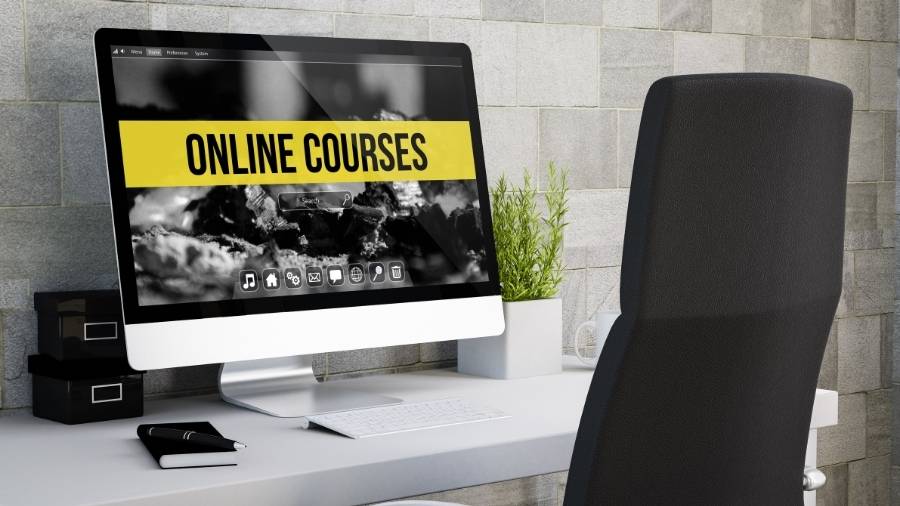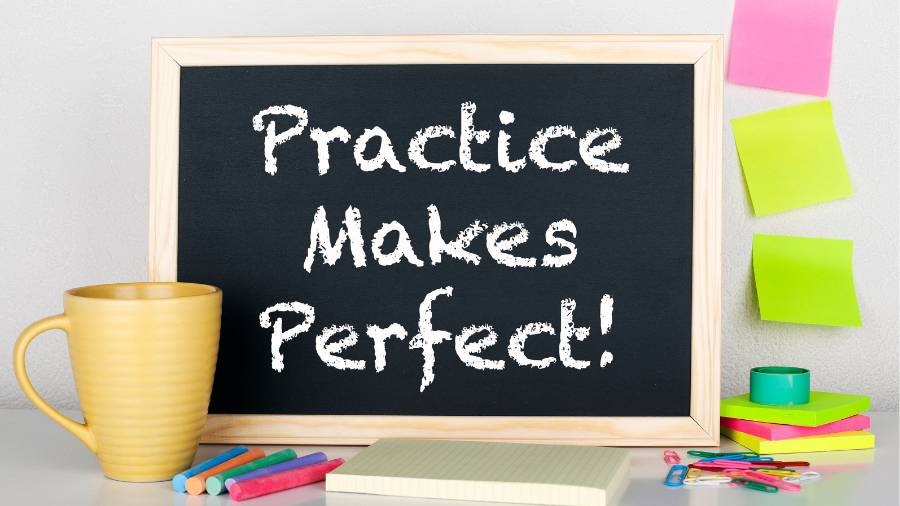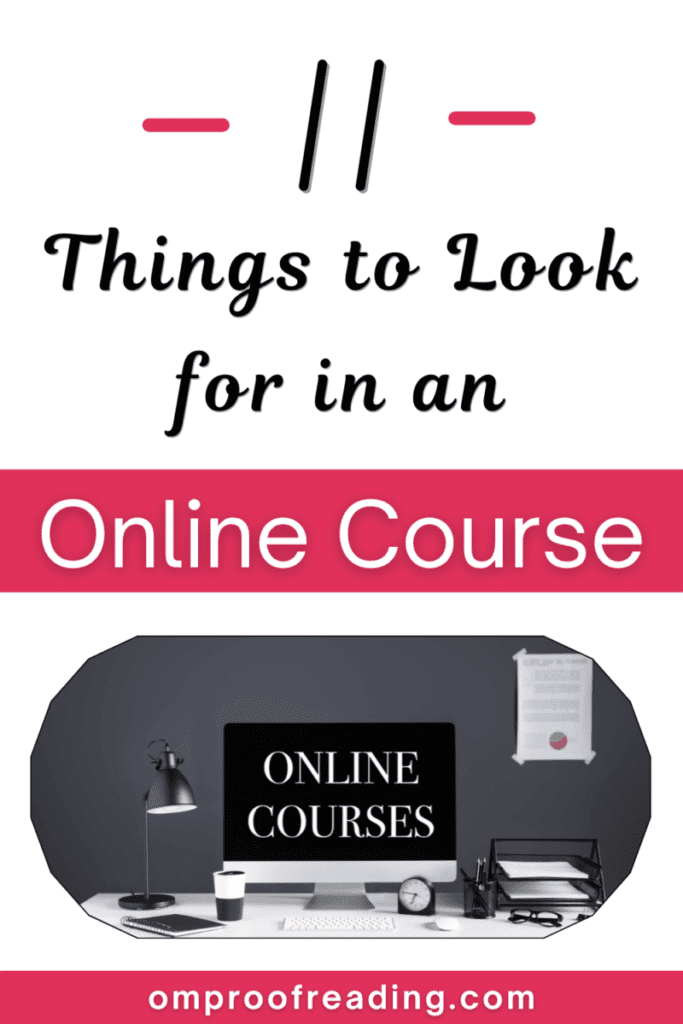This article may contain affiliate links. Please see our affiliate disclaimer in the footer menu for more information. Thank you for your support!

As someone who has benefited from taking several classes online, I can tell you what you need to look for in an online course to ensure it’s worth your while! Online programs can be an effective (and inexpensive) way to learn new knowledge and skills.
But before you decide on the course you may be considering, let’s examine the factors you need to contemplate.
Things You Need to Look for in an Online Course
Let’s see eleven essential elements you need to consider before deciding whether a particular online class is suitable for you.
1) A Comprehensive Program
- Does the course cover everything you think you should know to gain the knowledge you need?
Look at the modules/levels/units presented in the course and make sure they hit all the content you feel should be included.
Finishing a class only to realize that your knowledge and skills are still underdeveloped would be a bummer.
Sometimes it’s necessary to take multiple classes to master a skill, but other skills can be learned in just one class.
Since I write a lot of content about proofreading, I’ll use that as an example. Proofreading is a skill you can learn from one comprehensive course, and the one I took taught me everything I wanted to know.
It not only taught me how to be a successful proofreader but also how to start my own business and market myself. After completing that program, I was all set.
I didn’t need to fork over more cash to take a class to fill in gaps in the one I had just taken.
- Does it provide thorough training in all the relevant areas?
Make sure the course covers each aspect of what you’re learning in sufficient detail.
Both the breadth and depth of knowledge should be adequate.
- Does it follow a natural progression and have clearly defined learning objectives?
It should introduce what you’ll be learning and then logically guide you through the learning process.
2) A Reputable Course

- Is the course respected in its industry?
You’ll probably pay a low price if you take a brand-new class. But do you want to take the risk of being a test pilot?
If you do, that’s perfectly fine. However, most people will want to take a class that’s known to be a sound investment.
So how do you know if a course passes the sniff test? The best way to tell is to rely on independent reviews that aren’t found on the program’s website.
Note: You can sometimes find unbiased reviews on the sites that advertise classes. For example, Udemy is a well-known company that hosts online courses. Since the classes on Udemy are created by independent course creators (not Udemy) and verified students provide the reviews, you can typically trust these reviews.
Trustpilot is a reliable source for determining what students think about an online program.
Of course, not all classes have reviews on Trustpilot, but if they do, you’re in luck!
On Trustpilot, the company that provides the class receives an overall rating (out of five). You can also read reviews from students who have taken the class.
Reading the reviews can provide valuable insights into a class’s pros and cons. If you read enough reviews, you’ll see that many people have the same criticism and praise for a particular program.
These testimonials are a treasure trove of telltale tidbits that can help inform your decision!
You may also want to search Google to see if anything noteworthy pops up.
- Is the course accredited?
Accreditation may or may not be necessary, depending on your goals.
- How does the course compare to other similar classes?
You don’t want to dive headfirst into the only course you’ve encountered. Comparison is key to getting the most bang for your buck.
You can make your own comparison, or you may be able to find articles that compare the classes for you.
For example, in my article about the top four online proofreading courses, I provide a cost comparison chart and a chart that includes the main differences between programs so readers can quickly and easily compare them.
I also compare the classes according to numerous factors using bulleted lists for easy reading/skimming. Finally, I list the pros and cons of each.
Articles like this can save you lots of time if they present the courses honestly and accurately!
3) Excellent Value for the Money

- Is the price of the course justified for what you’ll receive?
Of course, you want a program that gives you excellent value for the money. Who wants to pay a ton and not get a ton? 😊
- Does the class have any unique selling points that are important to you?
For example, the proofreading course I took taught me how to create my own business and market myself to clients. Most proofreading classes don’t offer this impressive extra.
Since I wanted to be a freelance proofreader, the opportunity to learn about the business and marketing side of proofreading was appealing to me.
- Do you need to purchase any materials to take the class?
Are there any materials or textbooks you need to purchase? Some materials may be included, but you’ll need to factor in the additional cost if they’re not.
4) High-Quality Instruction that Matches Your Learning Style
- Does the instructor have experience in the subject they’ll be teaching?
I don’t think I would have wanted to take a proofreading course designed by someone who has never proofread a day in their life.
- Can they convey information in a way that’s easy to understand?
You may have had a brilliant teacher or professor who couldn’t communicate the material clearly. Their explanations may have made sense to their colleagues but not their students.
You want an instructor who meets students where they are and presents the course content comprehensibly.
- Is the material presented in a way that complements your learning style?
You need to consider whether you learn better visually, auditorily, kinesthetically, or through reading and writing. The best online programs allow you to learn via various mediums, such as videos, lectures, reading materials, charts, graphs, quizzes, and discussions.
Make sure at least some content is presented in a way that meets your needs as a learner.

- Are you actively learning by doing so that you can better understand and retain what you’re being taught?
Active learning emphasizes the student instead of the instructor. This kind of learning occurs when you do something other than merely listen to a teacher.
Although videos can effectively present certain material, they shouldn’t be the only format used since it’s a passive way of learning.
Instead, you should be drawn into the learning by doing other activities, such as completing worksheets, participating in group discussions, solving problems, and taking quizzes.
- Are you spoon-fed the material, or do you learn to hone your skills and find the information you need?
“Spoon feeding, in the long run, teaches us nothing but the shape of the spoon.”
– E.M. Forster
In the proofreading course I completed, we learned how to use our knowledge and resources to solve problems and find the needed answers. We were trained to be self-reliant.
I appreciated this teaching methodology because no one is there to give you the answers or make decisions for you in the real world of proofreading.
A bit of encouragement helps too!
The creator of the course I took implemented inspirational videos where she shared valuable knowledge she learned in the field. She also encouraged her students, which I found so motivating!
5) Appropriate Level of Difficulty

- Does the course provide the level of difficulty that’s right for you?
You’ll want to be challenged but not overwhelmed.
- Is it for intermediate and advanced students, or is it beginner friendly?
If you’re a novice, you certainly don’t want to enroll in a class designed for experts unless you want to feel like a fish out of water.
- Is the class challenging enough to sufficiently prepare you?
If the proofreading course I took had given students practice documents that only contained easy-to-find errors, we would have been at a disadvantage. In the real world of proofreading, you need to be able to identify a multitude of mistakes—not just the obvious ones that are easy to spot.
Although finding the trickiest of errors required in-depth training and made the class more demanding, this level of preparation was necessary to make students proficient proofreaders.
6) Ample Time to Access Online Course Materials
- Life throws curveballs, so if one comes your way, will you be able to put the program on hold and return to it later?
Many online classes are self-paced, so knowing how long you can access the material is crucial.
Paying a decent chunk of change and then finding out you’ve lost access to the course can be a real disappointment. The longer the program is available, the better you’ll be able to hedge against losing money should unforeseen circumstances come your way.
Most classes give students access for several months, sometimes up to one year.
Other programs provide lifetime access. Therefore, learners can continue their education as course creators update the program to reflect new industry standards and practices.
Extended access also means that students can refer to the content and refresh their skills as needed.
If you take a course that doesn’t provide lifetime access, you’ll need to manage your time wisely and keep up your momentum. You don’t want to go so slowly that you forget what you learn as you go or run the risk of never finishing the program.
7) Sufficient Real-World Practice

- Does the practice in the course eventually mimic what you’ll be doing in the real world?
If you’re taking a course to learn the knowledge and skills necessary to perform a job, the program should offer a healthy dose of realistic practice.
For example, a proofreading class shouldn’t just give you a bunch of grammar and punctuation worksheets and then send you on your way.
In the beginning, worksheets can be an effective way to master grammar and mechanics. But with time, you’ll need to delve into proofreading documents, just like you’d do with clients.
Regardless of what you’re learning, practice makes progress.
And training that mimics the real world of work will highlight your strengths and weaknesses so that you can adjust your learning accordingly.
“I hear and I forget. I see and I remember. I do and I understand.”
– Confucius
8) Opportunity for Feedback and Engagement
- How well is your learning progressing?
Throughout the course, you’ll hopefully have multiple opportunities to check your understanding of what you’ve learned. Many exercises, worksheets, quizzes, etc., that let you assess your know-how will likely be self-checking.
Some classes also require you to complete assignments, projects, exams, and the like, which are graded or assessed by the course creator or a tutor.
- What do you do when you have questions?
Some courses are designed so students can answer each other’s questions via a private group or other platform.
Then, if a student has a question that classmates can’t answer, a group moderator who is well versed in the material will help.
I participated in a private Facebook group when I took my proofreading course. Many students consider that group the most valuable part of the program.
Online learning can be isolating, but a dedicated space to interact with other learners can provide that much-needed social interaction.
I underestimated how much I’d learn from my peers in the class. The student interaction sparked so many insightful and thought-provoking conversations.

Also, since the group was well moderated, exchanges among students were always respectful. The group also motivated me and kept me engaged with the class.
Other courses are designed for students to engage with and get feedback from the course creator or a tutor.
And some programs assign students a tutor for the duration of the class.
Furthermore, some offer tutoring sessions for an added charge for learners who need extra help.
Just see how the class is designed to know what’s offered for free and what requires a fee!
9) Possibility of Obtaining a Certificate
- Can you obtain a certificate if you want something to show for your knowledge and skills?
Some courses offer certificates to everyone who finishes the class. Other programs only provide certificates to students who pass an exam. Would you prefer to be given a certificate or have to earn one?
10) User-Friendly Navigation
We have just a few points to ponder here:
- Is the course platform free of technical glitches?
- Is it easy to navigate?
- Does it track your progress to give you a sense of accomplishment?
11) Responsive Customer Support
Here are a couple of questions to consider:
- Who should you contact if you have any issues, like a problem with the course platform or a question about payment?
- Is the support team known to respond quickly, or are they elusive after receiving your payment?
That concludes our discussion about what to look for in an online course. I hope this article has given you some helpful tips for choosing a class that best meets your needs.
Throughout my experience with online programs, I’ve found that you get out of them what you put into them!
Good luck with getting the most out of your next online class!
Best wishes to you!
“I must be willing to give up what I am in order to become what I will be.”
– Albert Einstein

Recent Posts
Punctuation is important because it enables us to communicate our message clearly and effectively. Without punctuation, we wouldn’t understand how units of a sentence relate to one another or how...
Although you're probably somewhat familiar with adverbs, you may be unaware of sentence adverbs. As a trained proofreader who has studied the parts of speech, I can help you understand this unique...
